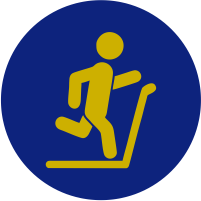Carpal and Cubital Tunnel Syndrome
What Is Carpal Tunnel Syndrome?
What Is Cubital Tunnel Syndrome?
Carpal tunnel syndrome (CTS) is the condition that results from increased pressure on one of the nerves in the wrist and hand. In patients with carpal tunnel syndrome, this nerve is compressed as it passes through the wrist. Because of the compression, the nerve does not function properly.
What Causes Carpal Tunnel Syndrome?
Carpal tunnel syndrome is caused by pressure on the median nerve.
The median nerve runs from your forearm through a passageway in your wrist (carpal tunnel) to your hand. It provides sensation to the palm side of your thumb and fingers, except the little finger. It also provides nerve signals to move the muscles around the base of your thumb (motor function).
Anything that squeezes or irritates the median nerve in the carpal tunnel space may lead to carpal tunnel syndrome. A wrist fracture can narrow the carpal tunnel and irritate the nerve, as can the swelling and inflammation resulting from rheumatoid arthritis.
There is no single cause in many cases. It may be that a combination of risk factors contributes to the development of the condition.
What Are The Symptoms of Carpal Tunnel Syndrome?
One can have a wide variety of carpal tunnel syndrome symptoms, but the condition typically causes numbness and tingling (paresthesias) in the hand, weakness in some of the muscles of the hand, and pain in the hand and wrist. Many of these symptoms become more pronounced at night, and patients with this condition often complain of inability to sleep.
- numbness, tingling, and pain in your thumb and the first three fingers of your hand.
- pain and burning that travels up your arm.
- wrist pain at night that interferes with sleep.
- weakness in the muscles of the hand.
What Are The Treatment Options For Carpal Tunnel Syndrome?
Treat carpal tunnel syndrome as early as possible after symptoms start.
Take more frequent breaks to rest your hands. Avoiding activities that worsen symptoms and applying cold packs to reduce swelling also may help.
Other treatment options include wrist splinting, medications and surgery. Splinting and other conservative treatments are more likely to help if you’ve had only mild to moderate symptoms for less than 10 months.
Nonsurgical therapy
If the condition is diagnosed early, nonsurgical methods may help improve carpal tunnel syndrome, including:
- Wrist splinting. A splint that holds your wrist still while you sleep can help relieve nighttime symptoms of tingling and numbness. Nighttime splinting may be a good option if you’re pregnant.
- Nonsteroidal anti-inflammatory drugs (NSAIDs). NSAIDs, such as ibuprofen (Advil, Motrin IB, others), may help relieve pain from carpal tunnel syndrome in the short term.There isn’t evidence, however, that these drugs improve carpal tunnel syndrome.
- Corticosteroids. Your doctor may inject your carpal tunnel with a corticosteroid such as cortisone to relieve pain. Sometimes your doctor uses an ultrasound to guide these injections.Corticosteroids decrease inflammation and swelling, which relieves pressure on the median nerve. Oral corticosteroids aren’t considered as effective as corticosteroid injections for treating carpal tunnel syndrome.
If carpal tunnel syndrome is caused by rheumatoid arthritis or another inflammatory arthritis, then treating the arthritis may reduce symptoms of carpal tunnel syndrome.
Surgery
Carpal tunnel release
Surgery may be appropriate if your symptoms are severe or don’t respond to other treatments.
The goal of carpal tunnel surgery is to relieve pressure by cutting the ligament pressing on the median nerve.
The surgery may be performed with two different techniques:
- Endoscopic surgery. Your surgeon uses a telescope-like device with a tiny camera attached to it (endoscope) to see inside your carpal tunnel. Your surgeon cuts the ligament through one or two small incisions in your hand or wrist.Endoscopic surgery may result in less pain than does open surgery in the first few days or weeks after surgery.
- Open surgery. Your surgeon makes an incision in the palm of your hand over the carpal tunnel and cuts through the ligament to free the nerve.
Our team is here for you
We offer the best, least invasive and least aggressive options to relieve your pain and symptoms so you can get back to the life you love. Atlantic Orthopaedic Specialists Hand To Shoulder Care Center has convenient locations in Virginia Beach, Norfolk and Chesapeake.




